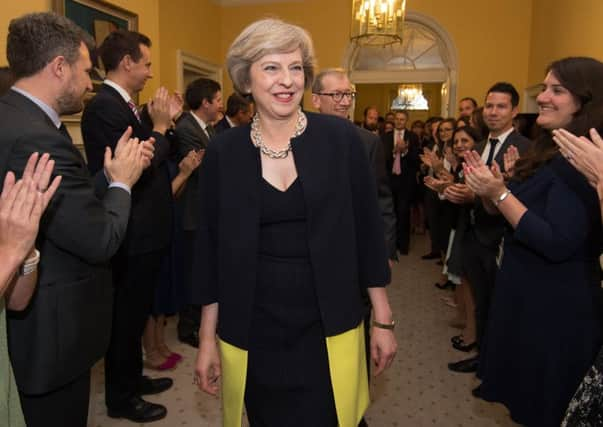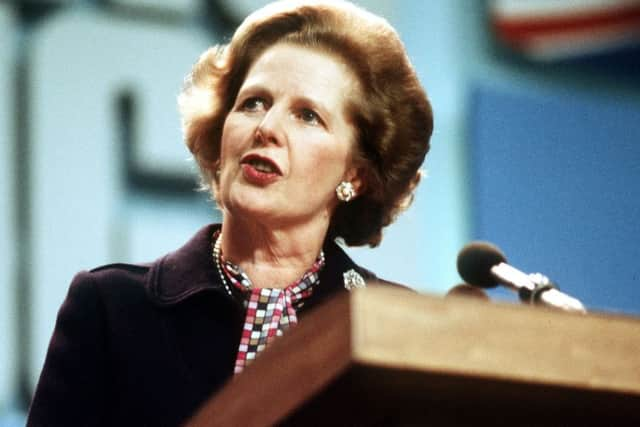Theresa May and the rise of female political leaders


“Pioneers may be picturesque figures, but they are often rather lonely ones,” observed Nancy Astor, the first woman to sit in the House of Commons.
It’s nearly a century since Astor became an MP during which time the political landscape in this country has changed dramatically. Since 1918, 450 women have been elected as MPs which might sound impressive but is actually less than the total number of men sitting in the current Parliament.
Advertisement
Hide AdAdvertisement
Hide AdBut is the tide of gender politics finally starting to turn? We now have more women MPs than ever before and one of the repercussions of the British public’s seismic decision to leave the EU has been rise of Theresa May who has emerged as the winner following the tumultuous political upheaval of the past three weeks.


May, though, is just the latest female politician to take charge of her party. North of the border, Nicola Sturgeon is enjoying widespread support at the helm of a resurgent SNP, while in Wales Leanne Wood is leader of Plaid Cymru.
This trio could soon be joined by Angela Eagle if she succeeds in ousting Jeremy Corbyn in the fractious battle for control of the Labour Party. Of course they could all be trumped (if you’ll pardon the pun) by Hillary Clinton, who in a few months time could become the most powerful person on the planet.
Dr Julie V Gottlieb is a Reader in Modern History at the University of Sheffield. Her research focuses on women in British politics and she believes that Theresa May’s appointment as Prime Minister is part of a wider phenomenon.
Advertisement
Hide AdAdvertisement
Hide Ad“The idea is being put forward that women are being catapulted into leadership roles to clean up the mess created by men. There’s a sense that it’s the women who are coming to the rescue. This goes back to the idea that women are the healers, the world’s natural diplomats and the social mothers of the nation.”


It’s a compelling argument, but Dr Gottlieb thinks we shouldn’t read too much into the fact that we are seeing more women taking some of the top political jobs. “It’s significant in a sense but we have to be careful and let May be her own woman and politician. It’s important not to assume there are too many similarities between Theresa May and Margaret Thatcher.
“They are each the products of their own time and place in history, and the generational difference does much to explain the very different ways they have responded to feminism. Let’s not forget that May co-founded Women 2 Win and actively seeks to promote other women, very unlike Thatcher,” she says.
“It’s interesting that the Conservative Party has produced two women leaders and the Labour Party hasn’t. So perhaps people should be asking why that is the case.”
Advertisement
Hide AdAdvertisement
Hide AdDr Gottlieb points out that the recent rise of female politicians is nothing new. “The history of women in the Conservative Party goes back to before the suffrage movement. The Party understood that women were great organisers and a great source of social power. Some Conservative women were sympathetic to feminism during the 1920s and throughout the Second World War.
“If you take Nancy Astor, she was quite a complex figure. On the one hand she was part of the elite and a keen supporter of appeasing Nazi Germany but in terms of gender politics she was very progressive. She was eager to represent women’s interests in Parliament and work with women across party lines in defence of women’s interests – very different from Mrs Thatcher who once said that feminism was a ‘poison.’
“Theresa May, on the other hand, is more sympathetic to feminism. But is it helpful to constantly be told that she is only the second ever female British Prime Minister? I don’t think it is and nor should we measure Theresa May against Margaret Thatcher – just because they are women it doesn’t mean they are the same.”
But Dr Gottlieb says there is a growing number of women who aren’t content to simply sit in the political background but want to take the lead. This, too, has its roots in the past.
Advertisement
Hide AdAdvertisement
Hide Ad“Some people are saying that women are taking leadership roles across the spectrum because it is for them to clean up the man-made mess of the referendum and we are seeing a feminisation of politics, that’s for sure.
“This resonates with the aftermath of the First World War and after women got the vote. Back then women wanted to heal wounds and hoped they were innately able to advocate peace.
“The backlash to this was the fear, on the part of men, that women’s entry into the political arena would lead to a nanny state, a governessing state. This idea that women do politics differently is at least a century old.”
There can be little doubt that we are witnessing a gender shift in the political landscape not only in Britain, but elsewhere in Europe. But as Dr Gottlieb points out this new generation of political figureheads certainly aren’t all singing from the same hymn sheet.
Advertisement
Hide AdAdvertisement
Hide Ad“If you look more closely there are more women emerging on the right of politics. You have Marine Le Pen in France and the Polish Prime Minister (Beata Szyldo) who come from a very different background to those who have been inspired by feminist and progressive politics.
“They each represent very different ideas. You can’t lump them all together just because they are women. We have to differentiate women’s political ambitions from women’s feminist aspirations.”
Dr Victoria Honeyman, lecturer in British Politics at the University of Leeds, is more circumspect about having a new woman PM.
“It’s a positive step to have a woman taking high office like this but there are still major gender inequalities in this country.
Advertisement
Hide AdAdvertisement
Hide Ad“For every £1 earned by men, women earn 77 pence and that’s not going to suddenly change just because we have a female Prime Minister.”
She is concerned, too, about the nature of the conversation surrounding May’s appointment. “In the last 48 hours I’ve been asked to comment on the similarities between Margaret Thatcher and Theresa May, which doesn’t happen with men.
“No one compared David Cameron with John Major or Michael Howard. So I’m not convinced we’re moving forward as fast as we should.”
She’s hopeful, though, that May’s success is a sign that tide has finally turned in women’s favour. “I’m not sure what a feminine style of politics actually looks like. But you would hope that this is part of a larger movement as more women become educated, go to university and have greater career choices.
Advertisement
Hide AdAdvertisement
Hide Ad“But it’s not that long ago there were more men called ‘David’ in Cameron’s cabinet than there were women.
“We still need greater equity between men and women and while we’re heading in the right direction we aren’t there yet.”
The rise of female political world leaders
Theresa May is just the latest female political leader. Other notable figures include:
Angela Merkel – The German Chancellor has cultivated the image of a prudent, pragmatic and down-to-earth leader, earning her the nickname “Mutti” – mother of the nation – over the past 11 years.
Advertisement
Hide AdAdvertisement
Hide AdErna Solberg – She is Norway’s Prime Minister and heads a right-wing minority coalition government assembled following elections in 2013.
Aung San Suu Kyi – Her party won 80 per cent of the votes in Myanmar’s elections last year. As the Constitution is designed to prevent her from becoming President, the Parliament created the new powerful position of State Counsellor; a role similar to that of Prime Minister.